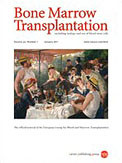Król L, Stuchlý J, Hubáček P, Keslová P, Sedláček P, Starý J, Hrušák O, Kalina T. Bone Marrow Transplant. 2011 Aug;46(8):1089–98. doi: 10.1038/bmt.2010.261. Epub 2010 Nov 8. IF: 3,660

Department of Paediatric Haematology and Oncology
Abstract:
Depletion of cellular immunity as a consequence of conditioning before allogeneic hematopoietic SCT (HSCT) frequently results in CMV reactivation, which may in turn lead to life-threatening infections and require timely antiviral treatment. We have investigated the functional signatures of CMV-specific CD4+ and CD8+ T-cells in 191 samples from 118 individuals. We compared healthy donors with both patients with high and undetectable viral loads, and those who controlled and did not control their CMV reactivations. Polychromatic flow-cytometric measurements of CD154 (CD40L), intracellular cytokines (IFNγ, IL2) and a degranulation marker (CD107a) allowed us to assess the functional status of various T-cells simultaneously. We found that dual IFNγ/IL2-producing CD8+ T-cells were present in patients controlling their CMV reactivations but absent from non-controllers. CD8+ T-cells that produce only IFNγ were the most abundant subtype, but they most likely represent non-protective memory cells. Distinct functional signatures were examined by hierarchical clustering, and this revealed that, unlike polyfunctional CD8+ T-cells, CD8+ T-cells that produce IFNγ alone were not functioning in concert with other subsets. In conclusion, our study revealed functional signatures that may be useful for immune monitoring, and it could change the interpretation of previous studies that assessed only IFNγ.
-mk-